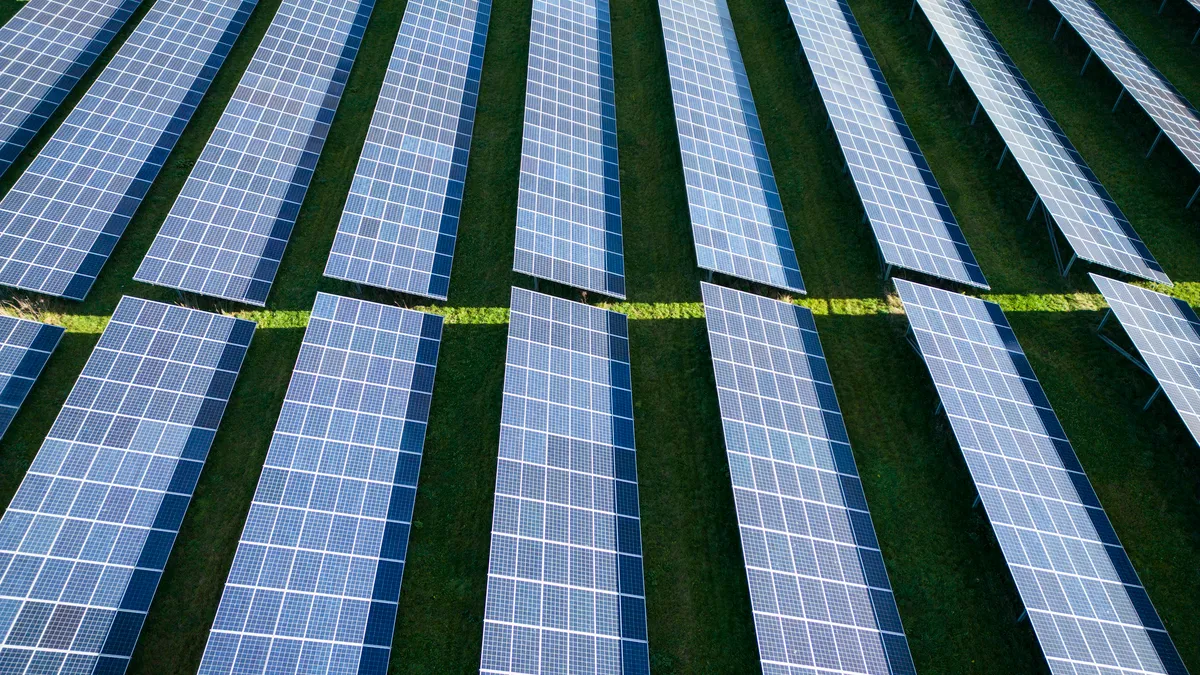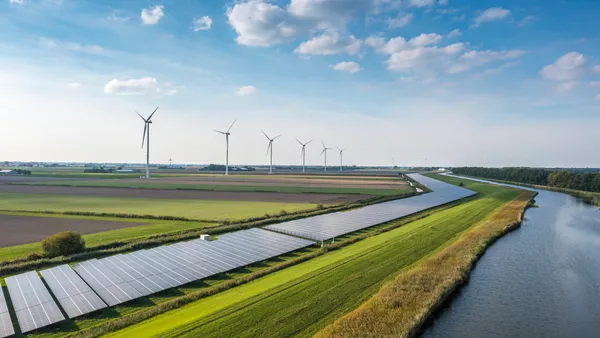Dive Brief:
- The U.S. Department of Commerce issued a final determination Friday that manufacturers of solar panels imported from four Southeast Asian countries circumvented tariffs on Chinese-made components, and import duties will be imposed on panels from those countries beginning June 2024.
- The department’s long-awaited decision received criticism from the solar industry and clean energy groups who fear it could derail the booming U.S. solar industry. In a statement, the American Council on Renewable Energy said “harmful solar tariffs” will “severely constrict solar availability.”
- The decision was also criticized by the Coalition for a Prosperous America, which released a statement supporting the circumvention finding but asserting that President Joe Biden’s two-year tariff pause on tariffs negated it by giving China time to build new facilities.
Dive Insight:
In its Friday announcement, Commerce said that its lengthy inquiry had found that five solar companies – BYD Hong Kong, New East Solar, Canadian Solar, Trina Solar, and Vina Solar – were guilty of attempting to avoid the payment of U.S. duties by completing minor processing on Chinese-made panels in Thailand, Cambodia and Vietnam.
Though none of the five companies were found guilty of circumvention in Malaysia, other companies that process there failed to respond to Commerce’s request for information, leading to a country-wide circumvention finding for all four countries.
That finding “does not constitute a ban on imports from those countries,” Commerce said. “Companies in these countries will be permitted to certify that they are not circumventing the [antidumping and countervailing duties] orders, in which case the circumvention findings will not apply.”
“The final determination affirms the preliminary findings in most respects and underscores the importance of rigorously enforcing trade law,” the department said.
The solar industry had been bracing for this finding since Commerce made a preliminary determination that circumvention was taking place in December. In June 2022, Biden had ordered a two-year moratorium on any new tariffs stemming from the investigation in an attempt to give the solar industry time to build out a domestic supply chain for panels.
Though the tax credits provided by the Inflation Reduction Act have bolstered U.S. solar manufacturing, and companies like First Solar have invested billions of dollars in new facilities since the tariff investigation was announced, much of the industry still expresses doubts that the U.S. will have broken its reliance on Chinese solar panels by next June.
“I could understand if this decision was made with a slow ramp down or five years, six years, or ten years down the road where it would be enforced. That would give US manufacturing a chance to build up to that,” Asim Hafeez, owner and president of Empower Energy Solutions, said in a comment.
In a January interview, DSD Renewables’ Chief Operating Officer Robb Jetty, said it would be “literally impossible” for the U.S. to build out its domestic supply chain by June 2024.
At the time, the domestic supply chain had seen significantly less investment, and First Solar had sold out of panels through 2024. Since then, however, First Solar alone has invested more than $5 billion in expanding its manufacturing facilities, panel manufacturer Enel North America announced a $1 billion investment to open its first U.S.-based factory, and solar joint venture VSK Energy announced $1.5 billion in U.S. solar manufacturing investment.
Carl Newton, vice president of strategic procurement and estimating at DSD Renewables, said that the final determination “reinforces” the company’s approach of procuring material for projects a year or more in advance.
“While clearly not a win for our industry, DSD has closely aligned with suppliers that aren't circumventing and will source as much domestically manufactured equipment as possible in the future as it becomes available,” Newton said in a statement.
Sheehan Gallagher, managing director of SGS Maine Pointe’s energy consulting practice, said in a comment that the decision poses a challenge for solar manufacturers, suppliers and other stakeholders that will make collaboration and communication “essential.”
“The decision will prompt a reevaluation of cost structures, as businesses may need to absorb higher tariffs or seek alternative cost-saving measures to maintain competitive pricing in the market,” Gallagher said. “Supply chain risk management will become even more critical as companies navigate the evolving tariff landscape.”
Though many in the solar industry have said the two-year pause won’t be long enough for the industry to avoid significant headwinds from new tariffs, opponents to the industry’s historical reliance on China have opposed the idea of a pause at all.
A joint resolution of disapproval meant to overturn the moratorium was passed by both the House and Senate in May, though it did not have enough support to survive a veto by the president.
In a Friday statement, the Coalition for a Prosperous America asserted that the tariff pause created a “loophole” for China, as it would give the country enough time to construct “wafer facilities outside of China — something the Chinese are doing right now.” The group pointed to Chinese solar manufacturer JinkoSolar’s 2021 construction of a wafer facility in Vietnam.
CPA said that China’s “actions after the passage of the American Recovery and Reinvestment Act” had “forced the closure of numerous U.S. solar manufacturing facilities between 2011–2014,” and said that “tens of billions of dollars in investment as a result of the IRA could disappear just as quickly as they were announced.”















